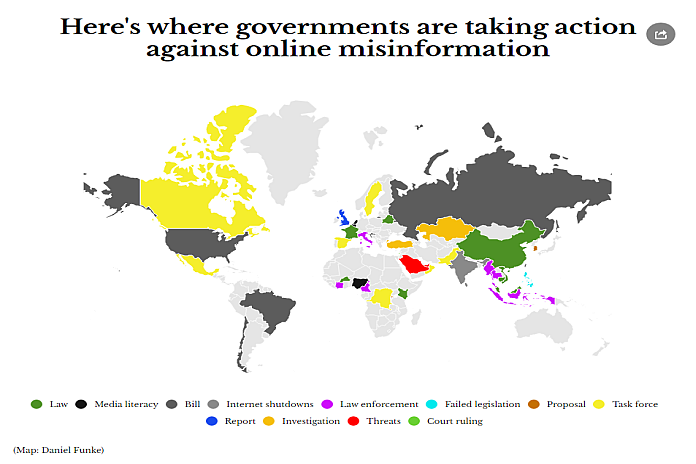By Ira Nuñez, Freelance writer
Social media has become part and parcel of every individual’s life. A survey reveals that six out of ten smartphone users check their phone less than a minute after waking up – whether to reply to messages, make a phone call, or browse social media.
But with social media becoming an integral element in one’s day to day life, can it be a trusted news source? Again, I say not all the time!
A study published in January 2022 said that fake news had become a significant part of social media, raising doubts about information credibility, quality, and verification since it rose to prominence during the United States of America presidential election in 2016.
In another study, researchers at Indiana University identified two kinds of false information – misinformation and disinformation.
They noted that these two types often go viral because “information overload and users’ finite attention span limit the capacity of social media to discriminate information based on quality.” The study defined misinformation as “false or misleading content including hoaxes, conspiracy theories, fabricated reports, click-bait headlines, and even satire” to shape or change public opinion on a given topic. Meanwhile, disinformation, which is spread through the same tactics, aims mainly to deceive.
What makes things worse is how fake news circulates. Often spread through fake social media accounts and trolls, fake news is said to spread faster than true stories on social media platforms like Twitter and Facebook.
The precise number of fake Twitter accounts is unknown. However, official estimates noted that fake accounts are less than 5 percent of its daily active users during the first quarter. Nevertheless, Twitter cautioned that the figures were based on estimates and could be higher, so Elon Musk’s $44-billion deal to acquire Twitter is on hold.
On the other hand, Facebook estimates that 5 percent of its worldwide monthly users are fakes. Moreover, the social network deleted some 1.7 billion fraudulent accounts in the second quarter of 2021 – indicating that fake profiles could account for nearly 25 percent. Research also noted that often, fraudsters retroactively change their usernames after registering on the platform.
People behind fake accounts and trolls convincingly fabricate reality on social media, transforming perception into reality, provoking and swaying opinions based on perceived numbers and power. In a paper entitled: “Trolls just want to have fun,” researchers led by Erin E Buckels of the University of Manitoba in Winnipeg found that the correlation between sadism and trolling was “so strong that it might be said that online trolls are prototypical everyday sadists.”

Poynter, a non-profit media institute that provides fact-checking and media literacy, has created a guide for existing attempts to legislate against what can broadly be referred to as online misinformation.
It can be observed on the map that only a handful of small nations have acted against online misinformation. And in the Caribbean, no single country has ever taken any initiative to combat fake news. Hence, many feasts on or make a living out of it.
I am left intrigued about what motivates these faceless keyboard warriors to engage in the act of nuisance. Hence, I have started the search for light.
Through observations, comparisons, and investigations, I have discovered that most Facebook groups in the Caribbean, especially those intended to tackle politics, are havens for “paid and sponsored” trolls.
The fake profiles are being used to either: 1.) amplify a message, 2.) drown out a contrary or conflicting message, or 3.) even create a false sense of the popularity of an idea or cause. Likewise, the fake accounts and trolls “seed” messages taken from blogs and pages are also created by themselves and are as well amplified by them.
What has caught my attention are the various Facebook groups on the small island of Dominica. It is noticeable that whether partisan or non-partisan groups, there are prominent trolls and suspicious accounts to instil uncertainty, malice, hatred, and doubt.
Under the Dominica Politics Group, one individual is said to be the “mastermind” behind a troll army – Trevor “Tossy” Johnson. His bread and butter are taking on multiple social media persona to accomplish his politically paid objectives purportedly. Trevor is allegedly professionally unemployed and retained by the opposition as a social media “influencer” via his numerous trolls and blogs. Based on undisclosed sources contacted in Dominica, he is known as a chaser of attention and fame.
One well-known account of Trevor is “Viva Mamo”. Using an eye as a profile photo, the account has ties to groups in Dominica and other regional Facebook groups. “Viva Mamo” is at the forefront of attacks on the Dominican government.
Another interesting profile controlled by Johnson is that of a “Judy Berry”, who claims to be currently residing in Gakona, Alaska, but has extensive knowledge of the daily happenings in Dominica, posting through MaBoyd’s kitchen.
Meanwhile, Trevor uses of a profile under the pseudonym “Dominque Pires” to rampantly post memes and photos harassing government officials and “bullying women’ and government supporters.
There are more personas taken by Trevor, namely Celia Gordon, Roger Bruney, DeeDee Easter, Gold Dust, Gols Dust, Marvin Sheldon Boland, and Zead Lloyd. Those profiles alternately post issues and cyclically discuss among themselves in the goal to intensify and create a commotion about the disinformation they share. Furthermore, since the group’s moderators are the same trolls of Trevor Johnson, Dominica Politics Group has become biased and partisan. Pro-government comments are hidden or deleted; labour supporters or mere curious Dominicans who want to know the truth are either blocked or removed.
The list of the fake accounts Trevor handles goes on and on and on […]. And mind you, it is hilariously funny because similarities are evident to the naked eye.
I also received information that this one-person troll army also exaggerates things, sensationalises events, and does scandalmongering through various blog sites like Mas in The Cemetery and Dominica Patriot – all in the aim to discredit what has been done, what is being done and what will be done by the government.
It is quite peculiar that Trevor has embraced trolling as a profession. Sources additionally disclosed that he is being paid directly and indirectly by the opposition and that he approaches his targets and extorts them to halt online attacks.
The battle to preserve truth has shifted online and is no longer fought in the streets alone. Fake news on social media may be inevitable but combating disinformation comes down to one easy thing – Think before sharing.





